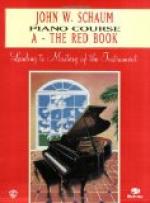In speaking of the great European teachers Mr. Roeder continued:
“We hear much of the Leschetizky method; but with that master technic is quite a secondary matter over which, when once the principles are mastered, he troubles himself but little. It is the conception of the work as a whole which concerns him, how to project it, so to say, most effectively to an audience. He brings into prominence now this part, now that, accenting here, slightly exaggerating there, in order to make the picture more vivid to the listener. Harold Bauer is another illuminating master for those who have a technical equipment adequate to the performance of great works of piano literature. Some go to him who are not ready for what he has to give, but to those who can direct attention to the meaning of the music, he is a wonderful inspirational force. First he will point out a phrase here, another there, and so on through the piece, showing how the same idea takes on various aspects in the composer’s thought. Then he shows how to gather up these different threads to form the perfect pattern which the author of the work had in mind; and finally the master teacher reaches down below the surface of form and design to the vital significance of the composition, and the disciple feels the glow and power of the revelation.
“There is no gainsaying the fact that this age is superficial, and the great office of art is to cultivate that idealism which will uplift and inspire. In an important sense the teacher must be a preacher of righteousness. He knows that ’beautiful things are fashioned from clay, but it has first to pass through the fire,’ and only those who can endure that scorching can hope to achieve success.
QUESTION OF PERSONALITY
“If asked to what extent a player’s personality enters into the performance, my answer would be: Only in so far as the performance remains true to the composer’s intention. So long as personality illumines the picture and adds charm, interest, and effectiveness to it, it is to be applauded; but when it obstructs the view and calls attention to itself it should not be tolerated. It is not art; it is vanity.
“Yes, I teach both high finger action and pressure touch, once the principle of arm weight is thoroughly established, although I use high finger action only to develop finger independence and precision, and for passages where sharp delineation is required. I believe in freedom of body, arm and wrist, a firm, solid arched hand and set fingers. That freedom is best which insures such control of the various playing members as to enable the player to produce at will any effect of power, velocity or delicacy desired; thereby placing the entire mechanical apparatus under complete subjection to the mind, which dominates the performance. In other words, I am neither an anarchist who wants no government, namely unrestrained devitalization, nor a socialist, whose cry is for all government—that is, restriction and rigidity. In piano playing, as in all else, ‘Virtue is the happy mean between two vices.’”




